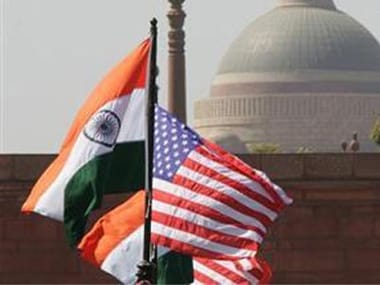New Delhi: The United States has told India it is considering caps on H-1B work visas for nations that force foreign companies to store data locally, three sources with knowledge of the matter told Reuters, widening the two countries’ row over tariffs and trade. The plan to restrict the popular H-1B visa programme, under which skilled foreign workers are brought to the United States each year, comes days ahead of US Secretary of State Mike Pompeo’s visit to New Delhi. India, which has upset companies such as Mastercard and irked the US government with stringent new rules on data storage, is the largest recipient of these temporary visas, most of them to workers at big Indian technology firms. The warning comes as trade tensions between the United States and India have resulted in tit-for-tat tariff actions in recent weeks. From Sunday, India imposed higher tariffs on some US goods, days after Washington withdrew a key trade privilege for New Delhi. Two senior Indian government officials said on Wednesday they were briefed last week on a US government plan to cap H-1B visas issued each year to Indians at between 10 percent and 15 percent of the annual quota. There is no current country-specific limit on the 85,000 H-1B work visas granted each year, and an estimated 70 percent go to Indians. [caption id=“attachment_4339593” align=“alignleft” width=“380”]  Representational image. News18[/caption] Both officials said they were told the plan was linked to the global push for “data localisation”, in which a country places restrictions on data as a way to gain better control over it and potentially curb the power of international companies. US firms have lobbied hard against data localisation rules around the world. A Washington-based industry source aware of India-US negotiations also said the United States was deliberating capping the number of H-1B visas in response to global data storage rules. The move, however, was not solely targeted at India, the source said. “The proposal is that any country that does data localisation, then it (H-1B visas) would be limited to about 15% of the quota. It’s being discussed internally in the U.S. government,” the person said. The US Embassy in New Delhi did not respond to a request for comment. A spokeswoman for the US Trade Representative’s office (USTR) referred questions to the State Department, which did not immediately respond to a request for comment. Tech sector Most affected by any such caps would be India’s more than $150 billion IT sector, including Tata Consultancy Services and Infosys Ltd, which uses H-1B visas to fly engineers and developers to service clients in the United States, its biggest market. Major Silicon Valley tech companies also hire workers using the visas. Stratfor analyst Reva Goujon on Twitter called the move “potentially another big blow to the US #tech industry amid US-#China economic battle,” a sentiment echoed on social media by some Indians and their supporters.
Potentially another big blow to the US #tech industry amid US-#China economic battle: WH may cap H1-B visas as a way to pressure #India to ease data localization laws
— Reva Goujon (@RevaGoujon) June 19, 2019
Exclusive: U.S. tells India it is mulling caps on H-1B visas to... https://t.co/syEfsxMJ9f
India’s Ministry of External Affairs has sought an “urgent response” from officials on how such a move by the United States could affect India, said one of the two government officials, who declined to be named due to the sensitivity of the matter. India’s Ministry of External Affairs, as well as the commerce department that is typically involved in such discussions, did not respond to an e-mail seeking comment.
Since last year, the Trump administration has been upset that US companies such as Mastercard and Visa suffer due to regulations in several countries that it says are protectionist and increasingly require companies to store more data locally.
India last year mandated foreign firms to store their payments data “only in India” for supervision, and New Delhi is working on a broad data protection law that would impose strict rules for local processing of data it considers sensitive. While governments the world over have been announcing stricter data storage rules to better access data in their jurisdictions, critics say restricting cross-border data flows hurts innovation and raises companies’ costs. In March the USTR, in a press note highlighted “key barriers to digital trade”, citing data-flow restrictions in India, China, Indonesia and Vietnam, among others. At a US-India Business Council event last week, Pompeo said the Trump administration would push for a free flow of data across borders, not just to help US companies but also to secure consumers’ privacy.


)

)
)
)
)
)
)
)
)



